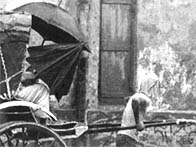Rickshaw blues
 Calcutta will soon bid a final goodbye to the rickshaw (hand-pulled cart), made famous the world over in Dominique Lapierre's City of Joy . While the end has been in the offing, the venerated rickshaw will be missed by most Calcuttans. Shooed off the roads primarily because of the advent of automobiles, the rickshaw pullers, mainly migrants from Bihar, Uttar Pradesh and Orissa, face an uncertain future.
Calcutta will soon bid a final goodbye to the rickshaw (hand-pulled cart), made famous the world over in Dominique Lapierre's City of Joy . While the end has been in the offing, the venerated rickshaw will be missed by most Calcuttans. Shooed off the roads primarily because of the advent of automobiles, the rickshaw pullers, mainly migrants from Bihar, Uttar Pradesh and Orissa, face an uncertain future.
As usual, the state administration has passed an order without really thinking of the aftermath. No alternate arrangements on how to sustain the 50,000 odd community has been chalked out. The pullers have been marginalised for some time now with the police banning them from plying on important roads. And on the lanes where they are allowed to operate, local police constables harass them by demanding a share of their earnings.
The phasing out of rickshaws also threatens scores of people earning their livelihood by making wheels and other accessories for the rickshaws. The latest diktat from the Marxist government also encompasses cycle vans and other forms of slow-moving vehicles. In addition, Calcutta's 500,000 illegal shops lining the sidewalks may also face a short-lived existence with the state venturing towards their possible demolition.
While the march towards the fast lane to impress foreign investors may lead to the desired objective, the plight of the rickshaw puller has been made insignificant. Yet, when monsoons, a regular Calcutta feature, make their appearance next year, it will be the rickshaw which will remembered for only these vehicles can wade through the knee-deep waters.
